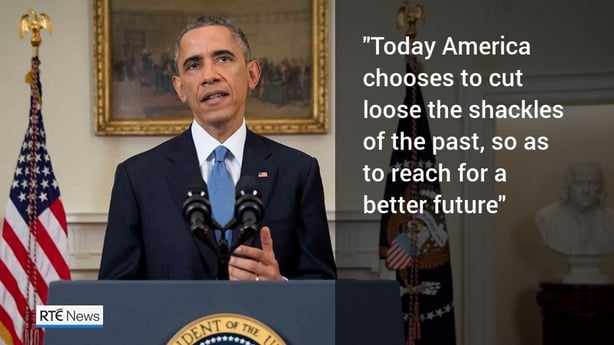Cuba has warned the United States that it wants American diplomats to stop aiding Cuban dissidents before the two countries can reopen embassies in each other's capitals.
The long-time adversaries are negotiating the restoration of diplomatic relations as a first step toward reversing more than five decades of confrontation.
Officials for both governments met in Havana in January and a second round of talks is expected to be held in Washington this month.
But Cuba's lead negotiator said in an interview broadcast on state television that if the United States wants free movement for its diplomats in Cuba, it must stop using them to support the political opposition.
"The way those [US] diplomats act should change in terms of stimulating, organising, training, supplying and financing elements within our country that act against the interests of... the government of the Cuban people," Josefina Vidal said.
"The total freedom of movement, which the US side is posing, is tied to a change in the behaviour of its diplomatic mission and its officials," said Ms Vidal, Cuba's top official for US affairs.
The US has long criticised the communist government for repressing opponents of the one-party system.
While public support for dissidents is limited, they receive plenty of attention from US and Western diplomats.
The United States says it supports Cuban activists who exercise their right to freedom of expression.
The restoration of diplomatic ties could happen before a regional summit in Panama in April, when US President Barack Obama and Cuban President Raul Castro would meet for the first time since shaking hands at the funeral of Nelson Mandela in December 2013.
Mr Obama and Mr Castro spoke on the phone the day before their separate but simultaneous announcements on 17 December that they would attempt to end their Cold War-era hostilities.

The warning by Ms Vidal suggested there were obstacles to restoring diplomatic ties, which has been seen as a relatively easy first step before the two sides try to resolve deeper differences on matters such as human rights and the US economic embargo of Cuba.
Ms Vidal said the conduct of Cuban diplomats in Washington was "impeccable", while suggesting the Americans were meddling in internal Cuban affairs.
"Matters of the internal affairs in Cuba are not negotiable," he said. "Nor are we going to negotiate matters of an internal nature regarding Cuban sovereignty in exchange for lifting the embargo. Beyond that, everything else is a process of negotiation."
Meanwhile, photographs of former Cuban leader Fidel Castro, 88, have appeared in official media for the first time since August, showing him slightly hunched over while seated, but appearing animated as he spoke with a student leader.
Speculation over Castro's health has intensified since the historic December announcement that the US and Cuba would restore diplomatic ties.
Fidel Castro, who periodically writes a column, went silent after the announcement until finally commenting a week ago, when he offered lukewarm support for the pact his brother reached with Mr Obama.
Cuba's Fidel Castro Appears in First Photographs Since August http://t.co/UEz3kliSum @nytimes Randy Perdomo and Frei pic.twitter.com/IabRT0r23C
— Andrés Sosa (@Ansosi) February 3, 2015The pictures of Fidel Castro with student leader Randy Perdomo were taken on 23 January, according to Mr Perdomo's account, which appeared with the photos on the website of the Communist Party newspaper Granma last night.
Granma published 21 pictures of the two men talking, with Fidel Castro in various poses of engaged conversation, viewing a video and flipping through a newspaper.
A Brazilian theologian who met Fidel Castro last week said the former leader was in good health, appearing skinny but lucid.
He stepped down from power due to poor health, handing over to his brother provisionally in 2006 and definitively in 2008.
Though he receives visitors, he has not appeared in public for more than a year.

